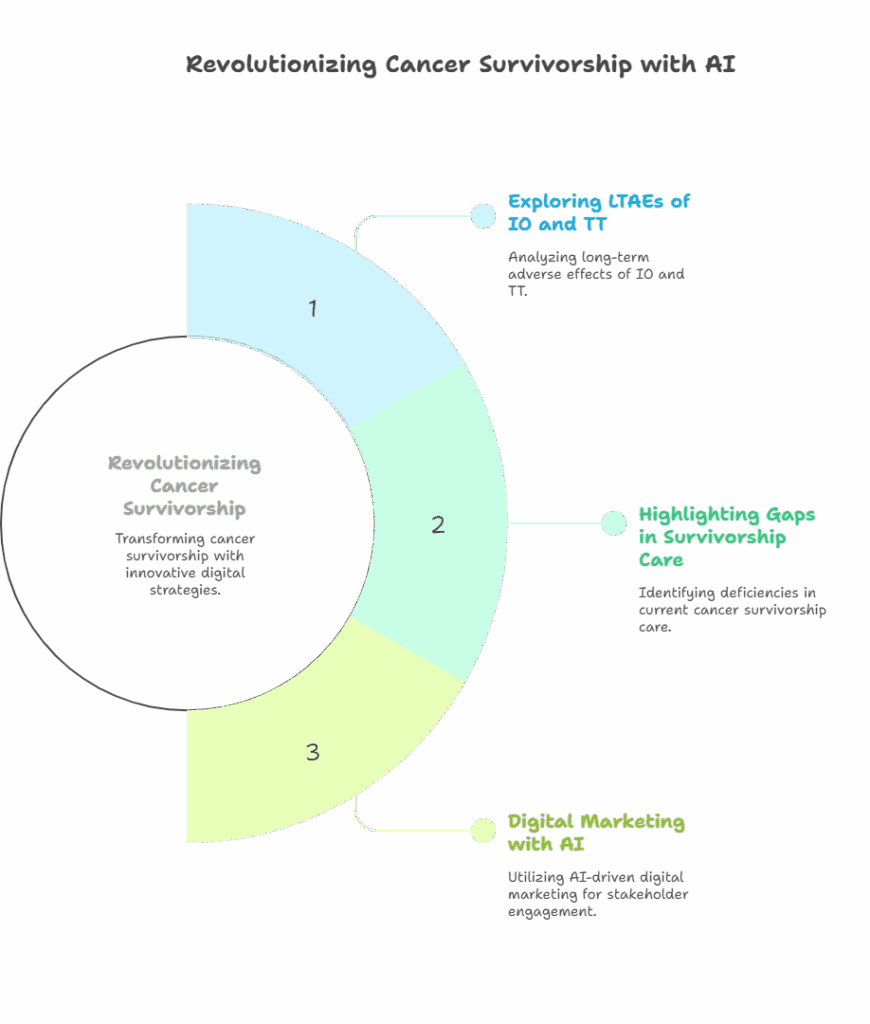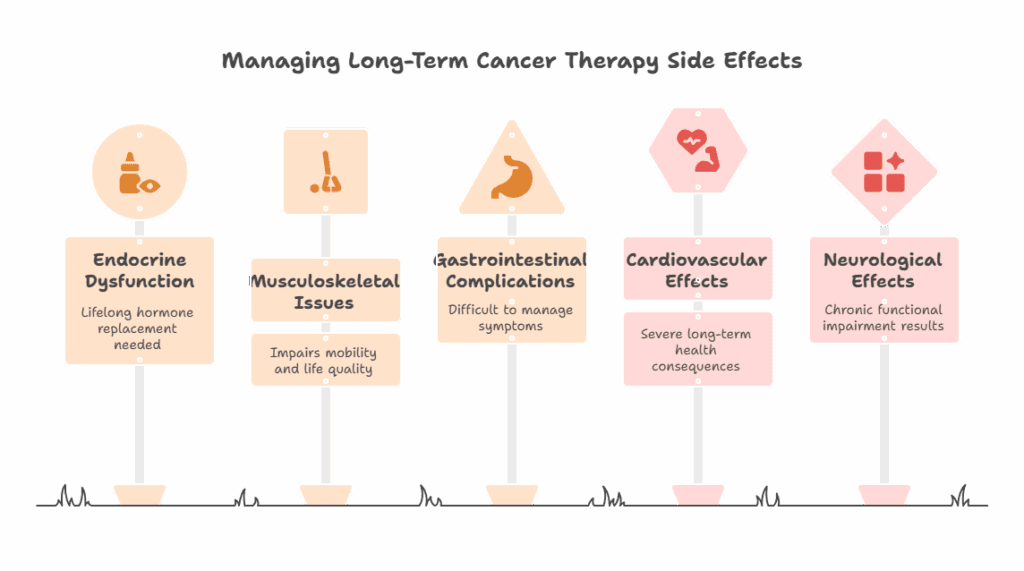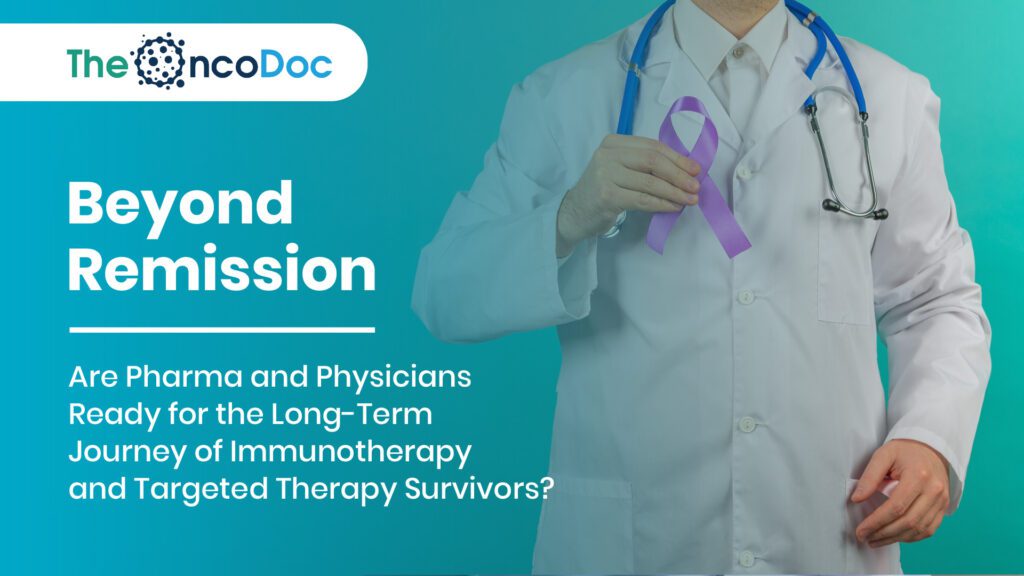Abstract
The advent of immunotherapy (IO) and targeted therapies (TT) has dramatically reshaped the landscape of cancer treatment, transforming once-fatal diagnoses into manageable chronic conditions for many patients. As survival rates improve and patient populations grow, a new frontier in oncology emerges: cancer survivorship, specifically the long-term management of unique and often complex side effects associated with these innovative treatments. This article delves into the evolving challenges and opportunities in supporting the growing cohort of IO and TT survivors in the US. It provides a comprehensive analysis of the distinct long-term adverse events (LTAEs) associated with these therapies, ranging from endocrine dysfunction and cardiovascular complications to neurotoxicity and persistent fatigue. We examine the critical need for improved education, monitoring, and proactive management strategies for these LTAEs among healthcare professionals (HCPs) and patients alike. Furthermore, this article explores how digital marketing, particularly through the lens of Artificial Intelligence (AI), is poised to revolutionize how pharmaceutical companies engage with oncologists, primary care physicians (PCPs), and patients to address these survivorship challenges. By leveraging AI-driven insights, personalized content delivery, and sophisticated digital platforms, pharma managers can play a pivotal role in disseminating crucial information, enhancing collaborative care models, and ultimately improving the long-term quality of life for cancer survivors. The discussion is supported by insights into the US oncology market and highlights how AI is becoming an indispensable tool for navigating this complex and emotionally charged new chapter in cancer care.

Introduction: The Triumph and Trials of Modern Cancer Survivorship
The last two decades have witnessed a paradigm shift in cancer treatment. The broad-spectrum chemotherapy and radiation of yesteryear have been increasingly complemented, and in some cases supplanted, by highly specific targeted therapies and groundbreaking immunotherapies. These innovations have unlocked unprecedented survival rates across numerous cancer types, extending lifespans and offering hope where little existed before. Patients who once faced grim prognoses are now living for years, even decades, beyond their initial diagnosis, becoming a rapidly expanding population of “cancer survivors.”
This triumph, however, brings its own set of trials. While the immediate, acute side effects of IO and TT are well-documented and managed during active treatment, the understanding and management of their long-term adverse effects (LTAEs) are still nascent. These LTAEs can be insidious, diverse, and often persistent, affecting various organ systems and significantly impacting a survivor’s quality of life long after active therapy has concluded. From endocrine dysfunctions to cardiovascular issues, neurological complications, and chronic fatigue, these challenges demand a specialized and coordinated approach to survivorship care.
For pharmaceutical companies, the landscape is evolving. Beyond developing and commercializing these life-saving drugs, there is a growing imperative to support the entire patient journey, which now extends far beyond remission. This includes empowering oncologists with the knowledge and tools to manage LTAEs, educating primary care physicians who often assume long-term follow-up, and providing patients with accessible, understandable information to navigate their post-treatment lives.
This article aims to dissect this critical new frontier of cancer survivorship. We will explore the specific LTAEs of IO and TT, highlight the gaps in current survivorship care, and, most importantly, present a compelling case for how digital marketing, powered by Artificial Intelligence, can revolutionize how pharmaceutical companies engage with all stakeholders to enhance the long-term well-being of these remarkable survivors.

The Evolving Landscape of Cancer Survivorship: Unique Challenges from IO and TT
Traditional cancer survivorship care often focused on surveillance for recurrence and managing late effects of chemotherapy and radiation (e.g., secondary cancers, organ damage). However, IO and TT introduce a distinct spectrum of LTAEs that require a new understanding and approach.
Understanding Immunotherapy-Related Long-Term Adverse Events (irLTAEs)
Immunotherapies, particularly immune checkpoint inhibitors (ICIs), work by unleashing the body’s own immune system against cancer. While incredibly effective, this heightened immune activity can sometimes turn against healthy tissues, leading to immune-related adverse events (irAEs). While many irAEs are acute, a significant proportion can persist or manifest months to years after treatment cessation.
Key irLTAEs include:
- Endocrine Dysfunction: Hypothyroidism, hyperthyroidism, hypophysitis, adrenal insufficiency, and type 1 diabetes are common. These often require lifelong hormone replacement.
- Musculoskeletal Issues: Persistent arthralgia, myalgia, or even inflammatory arthritis can significantly impair mobility and quality of life.
- Gastrointestinal Complications: Chronic colitis, inflammatory bowel disease-like symptoms, and persistent diarrhea are challenging to manage.
- Cardiovascular Effects: Myocarditis, pericarditis, and vasculitis, though rare, can have severe long-term consequences, including heart failure.
- Neurological Effects: Peripheral neuropathy, myasthenia gravis, or even encephalitis can lead to chronic functional impairment.
- Dermatological Issues: Chronic skin rashes, vitiligo, and dry skin can persist.
- Fatigue: Persistent, debilitating fatigue is one of the most common and impactful irLTAEs, often under-reported and poorly managed.
Understanding Targeted Therapy-Related Long-Term Adverse Events (ttLTAEs)
Targeted therapies work by specifically interfering with molecular pathways involved in cancer growth and progression. While generally less immunogenic than IO, they also have unique LTAEs that depend on the specific target and mechanism of action.
Key ttLTAEs include:
- Cardiovascular Toxicity: Hypertension, QT prolongation, and even heart failure are significant concerns with several classes of TTs (e.g., TKIs).
- Dermatological Issues: Rash, hand-foot syndrome, and hair changes can be chronic and distressing.
- Hepatotoxicity and Nephrotoxicity: Chronic liver or kidney dysfunction can occur with prolonged use.
- Endocrine Abnormalities: Thyroid dysfunction is common with many TKIs.
- Neuropathy: Peripheral neuropathy can persist long after treatment.
- Fatigue: Similar to IO, persistent fatigue is a common complaint.
- Musculoskeletal Pain: Arthralgia and myalgia can be chronic.
The Survivorship Care Gap: A Need for Integrated Management
The specialized nature of these LTAEs creates several gaps in current survivorship care:
- Lack of Awareness and Education: Many oncologists, focused on acute treatment, may not be fully equipped to manage the long-term, chronic nature of these effects. PCPs, who often take over long-term follow-up, may lack specific knowledge about IO/TT-related LTAEs, potentially misdiagnosing or under-treating them.
- Fragmented Care: Survivorship care is often fragmented between oncology, primary care, and various specialists (endocrinologists, cardiologists, neurologists). This leads to delayed diagnosis and suboptimal management.
- Patient Education Deficiencies: Patients often lack comprehensive information about what to expect post-treatment, when to seek help, and how to self-manage symptoms, leading to anxiety and reduced quality of life.
- Limited Tools for Monitoring: Standardized, easy-to-use tools for long-term monitoring and symptom reporting are often lacking.

Digital Marketing’s Role: Bridging the Survivorship Gap with AI
Pharmaceutical companies, as the innovators behind these life-saving therapies, have a crucial role and responsibility in supporting the long-term well-being of survivors. Digital marketing, supercharged by Artificial Intelligence, offers an unparalleled opportunity to bridge the survivorship care gap.
The Power of AI in Enhancing Survivorship Support
AI’s ability to process vast amounts of data, personalize information, and optimize delivery makes it an indispensable tool for addressing the complexities of IO/TT survivorship.
- Personalized HCP Education on LTAEs:
- The Problem: Oncologists and PCPs need specific, up-to-date information on IO/TT LTAEs, but their time is limited. Generic content is inefficient.
- The AI Solution: AI algorithms can analyze an individual HCP’s specialty, patient population, prescribing patterns (where permissible and anonymized), and prior engagement with educational materials.
- Implementation: An AI-powered platform can identify a PCP who treats a significant number of cancer survivors previously on a specific ICI for melanoma. It can then proactively deliver targeted educational modules on common endocrine irLTAEs associated with that ICI, including diagnostic criteria, management protocols, and referral guidelines. This ensures that the most relevant information reaches the right clinician at the right time, enhancing their capacity to manage LTAEs.
- AI-Driven Patient Support and Education Platforms:
- The Problem: Patients need accessible, understandable, and trustworthy information about their post-treatment journey, but online information can be overwhelming or unreliable.
- The AI Solution: AI can power intelligent chatbots, personalized content delivery systems, and interactive patient portals that provide tailored information based on their specific cancer type, treatment history, and reported symptoms.
- Implementation: A patient who completed treatment for lung cancer with an ICI and reports persistent fatigue and joint pain to an AI-powered symptom tracker could receive immediate, personalized resources: educational videos on managing irLTAE-related fatigue, stretches for joint pain, and prompts to discuss specific symptoms with their doctor. AI can also facilitate connections to support groups or specialized survivorship clinics.
- Facilitating Collaborative Care Pathways:
- The Problem: Fragmented care leads to missed diagnoses and delays in managing LTAEs.
- The AI Solution: AI can help map and optimize referral pathways by identifying specialists with expertise in IO/TT LTAEs within a patient’s geographic area. It can also integrate data across different healthcare providers (with appropriate patient consent and data privacy).
- Implementation: For a patient developing chronic hypophysitis after ICI therapy, an AI-powered system could identify local endocrinologists with reported experience in managing IO-related endocrine dysfunction, streamline the referral process, and even suggest necessary diagnostic tests. Pharma can support these AI-driven platforms to foster better communication between oncologists, PCPs, and specialists.
- Early Identification of LTAE Risks and Trends:
- The Problem: Identifying LTAEs early and understanding their prevalence is crucial for proactive management.
- The AI Solution: Machine learning models can analyze real-world data (electronic health records, claims data, patient-reported outcomes – all anonymized and aggregated) to identify patterns and predictors of specific LTAEs in larger patient populations.
- Implementation: Pharma companies can leverage these insights to refine risk stratification tools, inform educational campaigns about high-risk LTAEs, and even contribute to the development of new diagnostic markers. For example, AI might identify a correlation between certain genetic markers and a higher propensity for cardiovascular ttLTAEs, leading to targeted monitoring guidelines.
- Optimizing Content Strategy for Survivorship:
- The Problem: Developing a continuous stream of high-quality, relevant content for diverse audiences (oncologists, PCPs, patients) on complex survivorship topics is challenging.
- The AI Solution: Generative AI can assist in drafting educational materials, summarizing complex clinical guidelines into digestible formats, and even creating interactive infographics or patient stories (with careful human oversight for accuracy and empathy). NLP can analyze trending patient questions or HCP knowledge gaps to inform content development.
- Implementation: An AI tool could generate initial drafts of patient-friendly brochures on “Living with IO-Related Thyroid Dysfunction” or “Managing Fatigue After Targeted Therapy,” which are then reviewed and refined by medical experts. This accelerates content creation, allowing pharma to rapidly respond to evolving survivorship needs.

The US Oncology Market: A Responsibility and an Opportunity
The US oncology market is at the forefront of cancer innovation, and with this leadership comes a responsibility to address the downstream effects of successful treatments.
- Growing Survivor Population: The number of cancer survivors in the US is projected to grow significantly, placing increasing demands on the healthcare system to manage LTAEs.
- Evolving Reimbursement Models: Value-based care and bundled payments emphasize long-term outcomes and quality of life, making robust survivorship support increasingly important for market access and payer relations.
- Competitive Differentiator: Pharma companies that actively support the entire patient journey, including survivorship, will build stronger relationships with HCPs and enhance their brand reputation. This goes beyond product efficacy to genuine patient partnership.
- Regulatory Landscape: As the long-term impact of IO and TT becomes clearer, regulatory bodies may increasingly focus on comprehensive post-marketing surveillance and patient support. Proactive AI-driven solutions can help meet these evolving expectations.

Implementation Challenges and Ethical Considerations
Implementing AI-driven survivorship support requires navigating several critical areas:
- Data Privacy and Security: Protecting sensitive patient health information (PHI) is paramount. Robust cybersecurity measures and strict adherence to HIPAA regulations are non-negotiable. Anonymization and aggregation of data will be key.
- Ensuring Accuracy and Trust: AI-generated content or recommendations must be rigorously validated by medical experts to ensure accuracy and avoid misinformation, especially when directly engaging with patients.
- Maintaining Human Touch: AI should augment, not replace, human interaction. The empathetic and nuanced aspects of survivorship care still require skilled healthcare professionals. AI tools should be designed to empower clinicians and patients, not isolate them.
- Accessibility and Equity: Ensuring that AI-driven tools are accessible to all patient populations, regardless of socioeconomic status or digital literacy, is essential to prevent exacerbating health disparities.
- Measuring Impact: Developing robust metrics to assess the effectiveness of AI-driven survivorship programs (e.g., reduction in LTAE-related hospitalizations, improved patient-reported outcomes, enhanced HCP knowledge) will be crucial.

Conclusion: Charting a Course for Comprehensive Survivorship
The new frontier of cancer survivorship, shaped by the incredible advancements in immunotherapy and targeted therapies, presents both a profound challenge and an immense opportunity. As more patients live longer, high-quality, integrated long-term care for IO and TT-related adverse events is not just desirable but essential.
Pharmaceutical companies, equipped with the power of Artificial Intelligence, are uniquely positioned to lead this charge. By strategically leveraging AI for personalized education, proactive patient support, and enhanced collaborative care, pharma managers can move beyond the “pill and procedure” mindset to embrace a holistic view of the patient journey. This commitment to comprehensive survivorship care will not only solidify relationships with oncologists and other HCPs but, most importantly, will empower a growing population of cancer survivors to live fuller, healthier lives free from the unmanaged burdens of their life-saving treatments.
The question for pharma managers is no longer simply how to market their innovative drugs, but how to ensure these drugs’ profound benefits extend throughout a survivor’s entire life. AI provides the tools to answer this call, transforming cancer survivorship from a fragmented aftermath into a supported, thriving new chapter.
The Oncodoc team is a group of passionate healthcare and marketing professionals dedicated to delivering accurate, engaging, and impactful content. With expertise across medical research, digital strategy, and clinical communication, the team focuses on empowering healthcare professionals and patients alike. Through evidence-based insights and innovative storytelling, Hidoc aims to bridge the gap between medicine and digital engagement, promoting wellness and informed decision-making.



